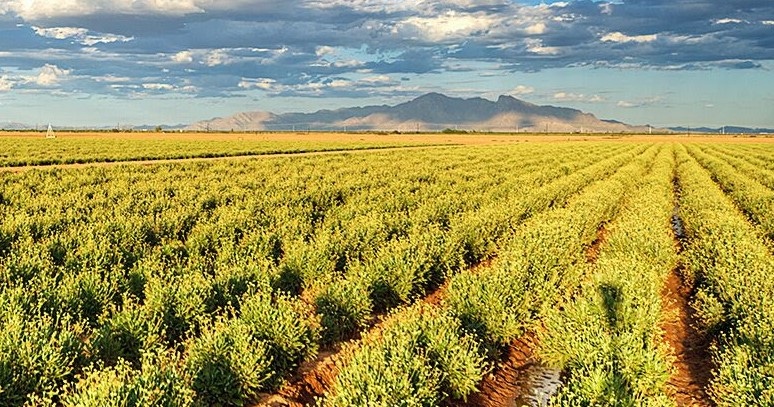
The unique desert plant guayule is pronounced why-yulie and current research has taken a lot of the “why” out of guayule.
Grown in Arizona and San Joaquin and Imperial valleys in California during World War II as a substitute for imported rubber, the perennial crop has been something of an enigma since then. Until folks at Bridgestone Tires decided to invest in the crop in 2012.
“We’ve had some really good research accomplishments and feel like we’re still on target for commercialization, possibly within the next couple of years,” says David Dierig, Bridgestone’s Agro Ops Manager for Guayule Research. “Initially we used transplants, but we’ve developed technology to direct seed, and that has saved time and money.”
Dierig and company agronomist Sam Wang are of the belief that Arizona could end up as the center of a bullseye called the Guayule Corridor. “It’s very likely that the first processing plant we build will be based in Arizona,” Dierig says. The company has been working experimentally with contracted acreage at Double D Farms in Marana and Tempe Farming Company in Maricopa.
Easier to manage
Agronomist Wang is enthusiastic about the plant itself. “Compared to alfalfa and cotton, guayule uses less water, less fertilizer, and is easier to manage,” he says. “You plant it, harvest it in the second year, and it re-grows without re-seeding -- three cycles over a six-year span.”
Guayule is a perennial crop that takes two years to reach harvest size before the entire shrub is harvested minus its roots.
“And we will be using every part of the plant,” emphasizes Dierig. “Rubber content is maybe six or seven percent of the plant. Once the rubber and resin is extracted, the remaining secondary compounds in the biomass, the bagasse, also has value and we expect our facility will utilize everything.”
With the likelihood that guayule has found a place in Arizona’s crop list, Dierig suggests growers had better start becoming familiar with the plant because it may present them an opportunity.
“With a prolonged drought and a constant rethinking about water availability, this is a crop that works well within a drought contingency plan because of its low water requirements,” he says. “It’s truly a desert plant.”
A local supply
And instead of relying on Asian Hevea rubber imports, having “a local supply of natural rubber latex is a benefit to us because if import supplies were ever cut off and we couldn’t import latex from Southeast Asia or China, this would provide security of supply,” he says. The tire giant has a sustainability goal of producing 30% of its natural rubber needs for tires from guayule.
Gary and Billie Deen of Double D Farms in Marana dared to gamble when Bridgestone agreed to pay them cotton-per-acre equivalent to grow guayule. Gary plowed and laser leveled some 30 acres, furrowed them bed-shaped in 38-inch rows before planting and furrow irrigating his sandy loam.
Guayule blooms white with yellow pollen from April through October with up to six irrigations to augment any natural rainfall.
Dan Thelander, part of a 5,000-acre, family-owned farming operation in Pinal County, is another contract guayule grower. He decided to allocate some acreage as part of his effort to find higher value crops with lower water use to increase profitability.
Thelander called guayule rubber a good cropping option. It’s “a great fit for irrigated desert farms where production could increase to meet future demand,” he says. “Guayule might just be that crop for us in the future.”
[Note: This story has been edited from an earlier version to correct details about cultivation.]
About the Author(s)
You May Also Like




